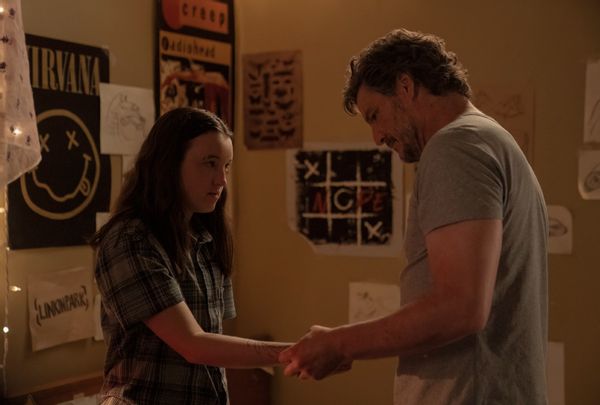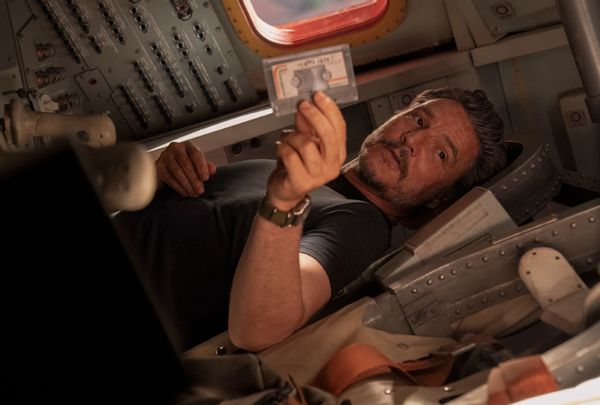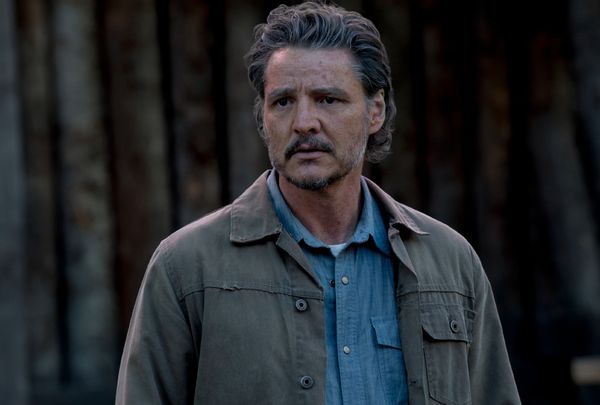"The Last of Us" helps us grieve by leaving nothing unsaid

We can never fully prepare for the death of someone we care about. Nobody tells you, or if they do, they can’t fully convey what that means. Even if your loved one has time to get their affairs in order, even if you think you’ve told them everything you wanted to say while they could hear it, there will always be details we missed. Questions left unanswered.
More haunting, perhaps, are the questions we didn’t think to ask, because we didn’t know better. Are these thoughts too heavy a load for a TV show based on a video game? That’s for you to decide.
But “The Last of Us” is not a standard console shooter pitting clear-cut white hats against bad guys. Joel, the main antagonist, survived an apocalypse for as long as he did by marauding before he turned to smuggling. Before civilization fell, he was a contractor struggling to support his little girl. She was killed the night the Cordyceps outbreak transformed nearly all of humanity into mindless, violent cannibals. It was also his birthday.
The dangling, tear-soaked thread of resentment made Joel’s death uniquely painful, and the sixth episode a welcome consolation.
Casting Pedro Pascal to play Joel in HBO’s adaptation guaranteed a baked-in sympathy for the character, even when he treated Ellie (Bella Ramsey), the 14-year-old he was hired to protect, with a heartless chill. We knew why, but she didn’t, making his affectionate turn at the end of the first season immensely moving, and his shocking death at the start of Season 2 pointedly cruel.
Now he’s a memory that Neil Druckmann, Craig Mazin and fellow writer Halley Gross revisit one more time, and at a point in Ellie’s journey when a vendetta threatens to obliterate her moral compass. When the season begins, Ellie is visibly upset with Joel, who can’t seem to do anything right. We’re left wondering whether she ever found out that Joel lied to her about what happened inside the Salt Lake City hospital, where a doctor was supposed to make a cure from her body.
Joel told Ellie that she was one of many immune people, rather than admitting that he had gunned down a hospital full of people because he valued her one life more than the prospect of her death aiding in saving humanity as a whole.
 Bella Ramsey and Pedro Pascal in "The Last of Us" (Liane Hentscher/HBO)At the end of the fifth episode, before Ellie tortures a doomed former Firefly named Nora (Tati Gabrielle) to find her quarry, Abby (Kaitlyn Dever), Nora thinks she’s shattering Ellie’s saintly image of her father figure by spitting that truth in her face.
Bella Ramsey and Pedro Pascal in "The Last of Us" (Liane Hentscher/HBO)At the end of the fifth episode, before Ellie tortures a doomed former Firefly named Nora (Tati Gabrielle) to find her quarry, Abby (Kaitlyn Dever), Nora thinks she’s shattering Ellie’s saintly image of her father figure by spitting that truth in her face.
Then Ellie delivers the real shock: She knows. Joel told her. But what else was left unsaid? That’s left hanging in the air like the mist of spores slowly consuming Nora alive. Then, just as suddenly, the scene cuts to black before transitioning into a glimpse of a younger Ellie waking up in her bed, smiling as Joel steps through her bedroom door to say good morning.
Beloved characters’ deaths disrupt our fragile sense of ease, even in shows where violence lurks around every corner. People who played “The Last of Us” knew what was coming in the same way anyone who read George R.R. Martin’s “A Song of Ice and Fire” novels was aware that Pascal’s Oberyn Martell's story was destined to end horribly on "Game of Thrones." In both cases, we may have hoped the TV adaptations would find a workaround for these terrible inevitabilities while knowing that was impossible.
What this episode does better than other TV shows that portray death and grief is explore the moments shared with someone who has died, especially a parent, and propose that we see ourselves through their eyes.
But the dangling, tear-soaked thread of resentment made Joel’s death uniquely painful, and the sixth episode a welcome consolation. The gist of it, expressed through a narrative montage of Ellie’s 15th through 19th birthdays, is that Joel always tried. He tried to do the right thing, tried to make Ellie happy, tried to be the kind of father the end of the world didn’t allow him to be to his own kid.
And he tried to follow his father’s advice, as seen relayed to him in a flashback to when Joel was a teenager in 1983. “I’m doing a little better than my father did,” says Joel’s dad (played by Tony Dalton). “And you know, when it’s your turn, I hope you do a little better than me.”
 Pedro Pascal in "The Last of Us" (Liane Hentscher/HBO). Joel’s death in the second episode broke viewers’ hearts. Some professed that it caused them to break faith with the show. (The same-day ratings didn’t bear that out; the third episode’s viewership was slightly higher.) But what this episode does better than other TV shows that portray death and grief is explore the moments shared with someone who has died, especially a parent, and propose that we see ourselves through their eyes.
Pedro Pascal in "The Last of Us" (Liane Hentscher/HBO). Joel’s death in the second episode broke viewers’ hearts. Some professed that it caused them to break faith with the show. (The same-day ratings didn’t bear that out; the third episode’s viewership was slightly higher.) But what this episode does better than other TV shows that portray death and grief is explore the moments shared with someone who has died, especially a parent, and propose that we see ourselves through their eyes.
Each of Ellie’s birthdays depicts how much harder it is to parent a teenager as they pull away. Her 15th is easy – the first time that she gets to act like a normal teenager. Joel gets her a cake, refurbishes a guitar, and serenades her with a halting, heartbreaking cover of Pearl Jam’s “Future Days” and its somewhat portentious lyrics: “If I ever were to lose you/ I'd surely lose myself/ Everything I have found dear/ I've not found by myself…”
For her 16th, Joel takes her to a science museum, where she lives out her dream of going to space by climbing inside the Apollo 15 command module. “I do OK?” he asks her, and she laughs. “Are you kidding me?”
But he doesn’t always, even when he means to. No parent can. On Ellie’s 17th birthday, he catches her smoking weed and making out with a girl, and freaks out. She responds by moving into the garage and reminding Joel that she’s not his daughter.
When Ellie turns 19 – the show skips her 18th birthday – she begins to question Joel’s version of the events related to Salt Lake City. But she puts her doubts aside to enjoy that year’s present: her first security patrol with Joel.
It’s supposed to be an easy, safe run. Instead, it turns out to be the most consequential to their relationship, as the two of them are called to help another patrol beset and find Eugene (Joe Pantoliano), Gail’s husband, after he’s been bitten.
Eugene begs Joel to see Gail one more time, and Ellie persuades Joel to make an exception since he’s not displaying symptoms. Joel appears to relent, sending Ellie ahead to get the horses, promising that he and Eugene will catch up with her.
Then Ellie balks, making Joel turn to her to say again, “I promise,” with the same expression he wore when he lied about Salt Lake.
Once Ellie is away, Joel leads Eugene to a postcard-perfect lake and kills him. Ellie returns to see Eugene’s body and understands what has happened. On their way home, Joel tells Ellie that he’ll tell Gail (Catherine O’Hara) “what she needs to know, and nothing more. It’s the right thing to do,” he finishes.
But Ellie doesn’t view Joel lying about this tragedy or any others as right. She stands by as Joel tells Gail his version of the event, saying that Eugene wanted to say goodbye to her in person, but he didn’t want to put her in danger; that he was brave; that he took his own life.
Ellie breaks in and tells Gail that’s not what happened. Eugene begged to see you, Ellie says. He had time, and Joel promised both Eugene and Ellie that he would bring Eugene home to Gail. But Joel shot Eugene in the head. This is why Gail hates Joel.
Nine months later, after the New Year's Eve party where Joel messes up again by trying to defend Ellie, he excuses himself to sulk with Ellie’s guitar on his porch.
Want a daily wrap-up of all the news and commentary Salon has to offer? Subscribe to our morning newsletter, Crash Course.
In the premiere episode’s version of the scene, Ellie comes home later, glares at him in silence, and walks to her garage retreat. But now we see her double back to confront Joel about his lies and demand that he answer her questions about Salt Lake City honestly. “Were there other immune people?” He quietly shakes his head. “Were there raiders?” Again, he shakes his head no.
“Could they have made a cure?” At this, Joel begins crying and nods yes, also confirming that he killed everyone.
“Making a cure would have killed you,” he explains, but that isn’t enough of an excuse for Ellie, who accuses him of robbing her of her life’s purpose.
Yes, Joel says, adding that he’ll pay the price, which in that moment he thinks only means she’ll turn away from him. Then he admits that if he had a second chance in that moment, he’d do it all over again.
“Because you’re selfish,” Ellie hisses.
“Because I love you,” he counters, “in a way you can’t understand. Maybe you never will.” Then he passes down his father’s message. “But if that day should come, if you should ever have one of your own, well then…I hope you do a little better than me.”
If you’ve ever denied a loving parent or cursed their efforts, those regrets may haunt you the most after they’re gone, and once you’ve matured into an adult who realizes how flawed we all are despite our best intentions.
 Pedro Pascal in "The Last of Us" (Liane Hentscher/HBO)Traveling through that rusty truth isn’t something most TV treatments of grieving venture to do or pull off as well as Mazin, Druckmann and Gross do in this episode, the second to last in a season colored by vengeance. Had “The Last of Us” followed the linear progression of action and reaction, with Joel’s death fueling Ellie’s yearning for retaliation, we’d need no further explanation. Survival horror stories get by on much less.
Pedro Pascal in "The Last of Us" (Liane Hentscher/HBO)Traveling through that rusty truth isn’t something most TV treatments of grieving venture to do or pull off as well as Mazin, Druckmann and Gross do in this episode, the second to last in a season colored by vengeance. Had “The Last of Us” followed the linear progression of action and reaction, with Joel’s death fueling Ellie’s yearning for retaliation, we’d need no further explanation. Survival horror stories get by on much less.
But this story reproduces the haunting we all carry, or will at some point if we’ve managed to connect with anyone else.
One of the last things Ellie says to Joel is, “I don’t think I can forgive you for this. But I would like to try.” Then the action returns to Seattle and the moments after Ellie has killed Nora, as she’s walking at nightfall back to the abandoned theater she and Dina (Isabela Merced) have made into their hideout.
This time, we’re the ones reading her face and left to guess how much of what we’ve seen is memory, or if it’s wishful thinking. Either way, it makes a person wonder whether any of us can completely make peace with what we can never know but only trust to be true. And, perhaps, we might resolve to say everything that needs to be said to those we care about before it’s too late.
New episodes of "The Last of Us" air 9 p.m. Sundays on HBO and stream on Max.
salon





